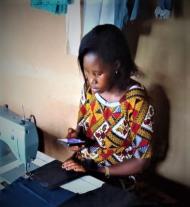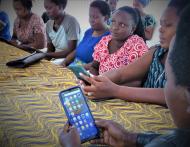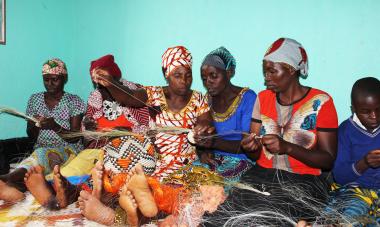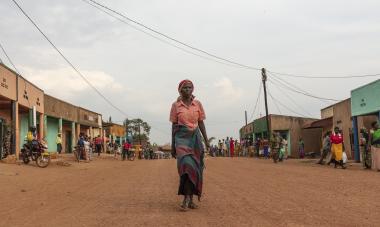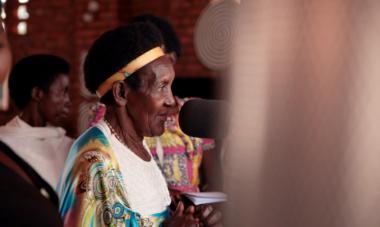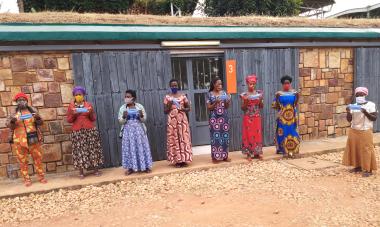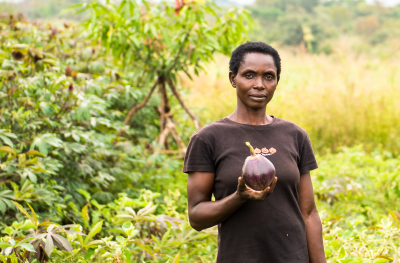Women account for a significant number of survivors of the Genocide Against The Tutsi in Rwanda, during which extremist violence by the Interhamwe claimed the lives of over one million people. In the wake of the widespread slaughter, torture and sexual violence, poverty was exacerbated, with many women struggling to feed their families with their wages. Through a digital approach by Women for Women Rwanda and the DreamStart Lab, these women are transforming their livelihoods through entrepreneurship, savings and investments.
Health, Economic Wellbeing, and Empowerment
Marie Claire joined her local Village Savings and Loan Associations (VSLAs) through Women for Women Rwanda’s (WfW-Rwanda) Stronger Women, Stronger Nations Program (SWSN).
With the savings from her VSLA, (community-based savings groups for residents in impoverished communities to manage their finances), she purchased 20 sewing machines to establish a tailoring business and hired 20 women. Through her training as a digital champion, she uses the DreamSave app to check the work of her bookkeepers.
“The money I get from my business, enabled me to financially contribute to the development of my family which also makes my husband Jean Paul proud,” Marie Claire says. “In addition, this project has enhanced my confidence in using technology as I now know how to use DreamSave app and able to support bookkeepers whenever they commit errors while conducting meetings and entering data in DreamSave app. I am very happy to serve as digital champion.”
In Kirungi Viviane’s community within the Kayonza District, poverty impacted her access to healthcare and the ability to pay for new clothes and her children’s school fees. Her living conditions diminished her self-esteem, and she felt isolated and without hope for the future.
After joining her local VSLAs, Kirungi received a message through the DreamSave app about her savings progress. The information led her to start a pig farm. To initiate this idea, she borrowed 40,000 Rwf ($36.61 USD) from the savings group to buy a pig, which gave birth to six piglets that she sold for 15.000 Rwf ($.14 USD) each. From there, her farming business evolved. Soon, she went from earning the wages of a laborer to receiving around 65,000 Rwf (almost $60 USD) each month.
Kirungi and Marie-Claire’s stories are two of many testaments to WfW-Rwanda’s mission to assure that women in marginalized, impoverished communities have the resources to change their lives. WfW-Rwanda is Women for Women International’s (WfWI) sister organization and was established in 1997 to meet the needs of women survivors of the Genocide Against The Tutsi in Rwanda.
Research has shown that VLSAs have created a significant impact for women living in rural areas, including improved “health, economic wellbeing, and empowerment.”
The goal is financial inclusion for marginalized women in the aftermath of the genocide. To reach this goal, the organization is collaborating with the DreamStart Lab to convert women’s conventional savings groups to a digital format through the DreamSave app. In turn, women previously unable to access these resources can become entrepreneurs.
“Our role is to allow them access to financial services like deposits, payment and loans,” says Gahamanyi Nelson, WfW-Rwanda staff member.
Wealth Equality through Financial Access
Longstanding tension toward the Tutsi ethnic group by Hutu extremists erupted in 1994, following the death of President Juvenal Habyarimana which Tutsis were accused of orchestrating. Ten percent of Rwanda’s population was killed over 100 days, and two million were displaced during “one of the most intense events of political violence since World War II.”
Before the genocide, drought, limited government spending and a decline in exportation defined Rwanda’s economy. The devastation caused by pervasive slaughter and looting made it only worse for survivors of the genocide, 70 per cent being women. In 1994, Rwanda’s gross domestic product (GDP) declined by almost 60 per cent, the country’s most prominent industry of agriculture impacted through a lapse in crop production.
The economy has since improved and is recovering from the COVID-19 pandemic, though climate change threatens to create damage to the country’s agriculture and livelihood. As part of their mission to reduce wealth inequality among women marginalized by the impact of the genocide, WfW-Rwanda incorporated the use of the DreamSave app into its programming.
“Women for Women Rwanda tackles inequalities for the women in Rwanda,”
says Catherine Gashegi Kampire, WfW-Rwanda Program Manager. “In this project, we teach them business skills, network them, increase their access to finance [and] loans hopefully, and other opportunities that can help them in their growth.”
Through digitizing WfW-Rwanda’s savings groups using the DreamSave app, financial inclusion and enhanced economic wellbeing is becoming a reality.
“If you leave out a group of people who are economically disadvantaged, then you leave out a group of people who are living in rural areas who don’t really have access to opportunities that these bigger scale players have,” says Charlene Migada, Souk Farms Commercial Manager.
“What we learned from Women for Women Rwanda which will help us realize our goals is how to develop business plans, and work with financial inclusion,” says a program participant.
“You Have to Support People to Have that Healing Effect”
As part of their path to healing and joining a network of support for their goals, women are becoming entrepreneurs and forming community as they join together for one purpose: to radically transform their lives.
“If we are able to give a little bit of support, we can really work slowly by slowly to close that gap and make sure that we are all working toward the common good of the people.”
So far, 400 VSLAs with 10,000 members have been digitized, and 36 women have been trained to provide technical support for the DreamSave app, which increases their self-reliance with digital finance management.
In 2021, 29% of surveyed WfWI graduates earned on average more than one dollar a day. Before taking the survey, over 86 per cent said they earned less than 15,000 RwF ($20 USD) from their primary means of livelihood.
One woman worked with WfW-Rwanda’s Cooperative de Distribution Des Fraises de Muhanga (Muhanga Strawberry Distribution Cooperative or CODFM) to secure a bank loan and buy a plot of land to sell strawberries.
“We have already paid back the loan and the next step will be constructing the plant,” she says.
Another began to harvest French beans. “If we earn a lot from selling French beans, we don’t just keep the money idle in our bank account,” she says. “Instead, we invest it in purchasing and storing harvest from local farmers.”
In communities once extremely affected by the genocide, the situation for marginalized women is improving. As they transform their lives through entrepreneurship, and learn how to save, earn and invest money, they are breaking the cycle of poverty for themselves and their families and rebuilding their communities.
“There has been a lot of trauma and aftereffects of the genocide,” Catherine says. “And for any development to happen, you have to support people to have that healing effect.”

